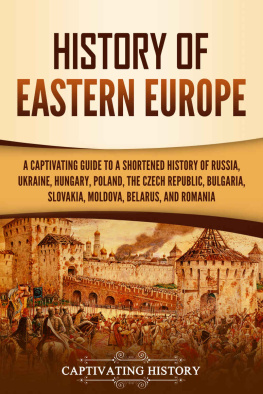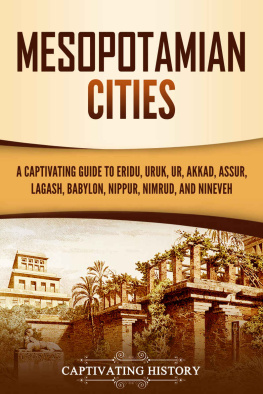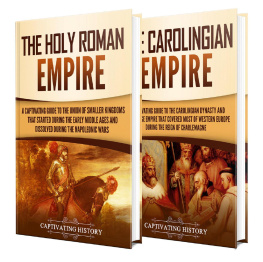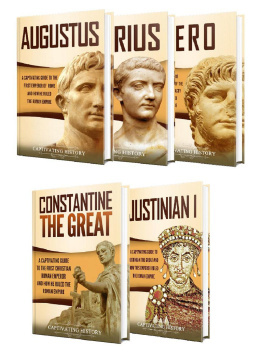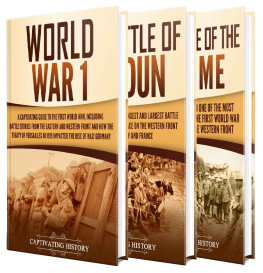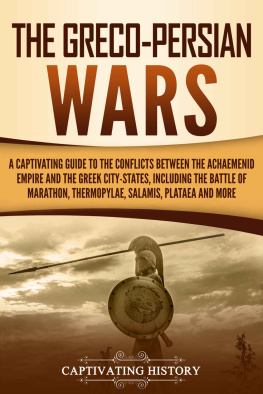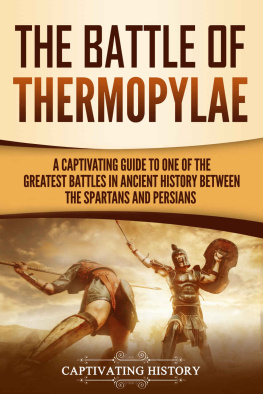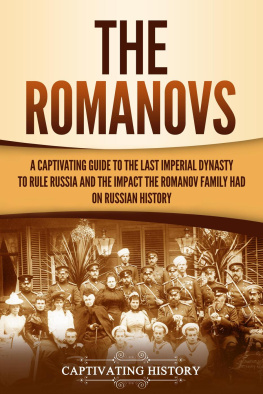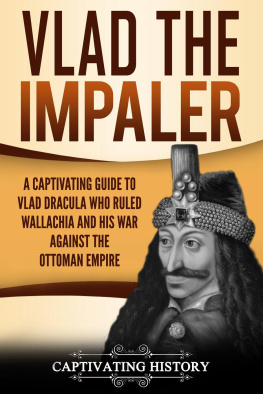Captivating History - The Battle of Chancellorsville: A Captivating Guide to an Important Battle of the American Civil War
Here you can read online Captivating History - The Battle of Chancellorsville: A Captivating Guide to an Important Battle of the American Civil War full text of the book (entire story) in english for free. Download pdf and epub, get meaning, cover and reviews about this ebook. year: 2020, genre: History. Description of the work, (preface) as well as reviews are available. Best literature library LitArk.com created for fans of good reading and offers a wide selection of genres:
Romance novel
Science fiction
Adventure
Detective
Science
History
Home and family
Prose
Art
Politics
Computer
Non-fiction
Religion
Business
Children
Humor
Choose a favorite category and find really read worthwhile books. Enjoy immersion in the world of imagination, feel the emotions of the characters or learn something new for yourself, make an fascinating discovery.

- Book:The Battle of Chancellorsville: A Captivating Guide to an Important Battle of the American Civil War
- Author:
- Genre:
- Year:2020
- Rating:3 / 5
- Favourites:Add to favourites
- Your mark:
- 60
- 1
- 2
- 3
- 4
- 5
The Battle of Chancellorsville: A Captivating Guide to an Important Battle of the American Civil War: summary, description and annotation
We offer to read an annotation, description, summary or preface (depends on what the author of the book "The Battle of Chancellorsville: A Captivating Guide to an Important Battle of the American Civil War" wrote himself). If you haven't found the necessary information about the book — write in the comments, we will try to find it.
Captivating History: author's other books
Who wrote The Battle of Chancellorsville: A Captivating Guide to an Important Battle of the American Civil War? Find out the surname, the name of the author of the book and a list of all author's works by series.
The Battle of Chancellorsville: A Captivating Guide to an Important Battle of the American Civil War — read online for free the complete book (whole text) full work
Below is the text of the book, divided by pages. System saving the place of the last page read, allows you to conveniently read the book "The Battle of Chancellorsville: A Captivating Guide to an Important Battle of the American Civil War" online for free, without having to search again every time where you left off. Put a bookmark, and you can go to the page where you finished reading at any time.
Font size:
Interval:
Bookmark:
All Rights Reserved. No part of this book may be reproduced in any form without permission in writing from the author. Reviewers may quote brief passages in reviews.
Disclaimer: No part of this publication may be reproduced or transmitted in any form or by any means, mechanical or electronic, including photocopying or recording, or by any information storage and retrieval system, or transmitted by email without permission in writing from the publisher.
While all attempts have been made to verify the information provided in this publication, neither the author nor the publisher assumes any responsibility for errors, omissions or contrary interpretations of the subject matter herein.
This book is for entertainment purposes only. The views expressed are those of the author alone, and should not be taken as expert instruction or commands. The reader is responsible for his or her own actions.
Adherence to all applicable laws and regulations, including international, federal, state and local laws governing professional licensing, business practices, advertising and all other aspects of doing business in the US, Canada, UK or any other jurisdiction is the sole responsibility of the purchaser or reader.
Neither the author nor the publisher assumes any responsibility or liability whatsoever on the behalf of the purchaser or reader of these materials. Any perceived slight of any individual or organization is purely unintentional.
Table of Contents
Hi History Lovers!
My name is Matt Clayton, and Im the creator of Captivating History. First off, I want to THANK YOU for reading our books in the Captivating History series. As an avid reader of History myself, I aim to produce books that will hold you captive.
Now you have a chance to join our exclusive history list so you can get the ebook below for free as well as discounts and a potential to get more history books for free! Simply click the link below to join.
P.S. If you join now, you will also receive a free Mythology book. Remember that its 100% free to join the list.

Click here to access your bonus
Also, make sure to follow us on:
Twitter: @Captivhistory
Facebook: Captivating History: @captivatinghistory
Through the centuries, there have been battles that have transcended time. While many battles (some of them quite decisive in their own quiet way) have been assigned a place as a historical footnote, others live with us, sometimes centuries or even millennia after they took place.
The Stand of the 300 at Thermopylae, Alexanders defeat of the Persians at Gaugamela, Caesars victory over the Gauls at Alesia, the revolutionary victories of Napoleon before his defeat at Waterloo (itself a symbol of utter defeat), the American victory at Yorktown to end the Revolutionary War, Gettysburg, the Battle of the Somme in World War I, Pearl Harbor, Stalingrad, the Bulge, the Tet Offensiveand so many more.
For military scholars, armchair historians, and buffs of the American Civil War, there is one other battle that should be included on that list, for it was a masterpiece of military planning and execution, though, in the end, its impact was less decisive at the time than it might have been on the officers and men who studied it afterward.
The Battle of Chancellorsville took place in 1863. One hundred fifty-seven years later, what Robert E. Lee and Thomas J. Stonewall Jackson did on that battlefield in Virginia is still being taught at the United States Military Academy, also known as West Point, and other military schools around the world. This battle, more than any other in the Civil War, cemented these two Southern military leaders as legends, as bold and innovative battlefield commanders. In fact, the battle has come to be called Lee's Perfect Battle. Jackson, however, would not live to enjoy the laurels of their victory, but that we will discuss in great detail toward the end of this volume.
With their victories at Chancellorsville and at Fredericksburg, which took place immediately afterward, the Confederate Army was able to mount its invasion of the North, which ultimately took them to a small town in Pennsylvania named Gettysburgbut that is a battle for another time.
Let's be clearthe American Civil War was fought over slavery. Some may argue that the conflict was fought over states rights, and there can be a logical point made for that. However, the one right the South was fighting to keep the most was slavery.
Since its inception, the United States had been wrestling with itself over the issue of slavery. How could a nation founded on the principle that states All men are created equal allow the enslavement of others? People today still wrestle with that. They needn't do so. For most white people in the South and a good many in the North, Africans (the polite name that many in the community were referred to as) were not people .
By the beginning of the Civil War, Africans had been in bondage in North America for about two and a half centuries. They were captured or bought (from other Africans or Arab slave traders) in Africa and then brought to the Western Hemisphere. They were also bred into slavery. Children and their parents were torn from each other, just like chattel animals. With the ratification of the US Constitution in 1787, slaves were labeled as three-fifths of a person for tax, census, and political reasons.
In the years between the establishment of the United States and the start of the Civil War in 1861, the government and the people of America wrestled with the question of slavery. By 1852, with the publication of Uncle Tom's Cabin by Harriet Beecher Stowe, many in the North were pushing for the abolition of slavery in the entire country or, at the very least, the prevention of new slave states being established.
In the South, where the economy was based on agriculture, the sentiments to limit or eliminate their virtually cost-free source of labor didn't fall on deaf earsin fact, it enraged the people. The North, which was much more populous than the South, was also far richer and was seen by many (especially by the ruling classes in the southern part of the country) as pushy and power-hungry. To them, it seemed as if the men in the North were trying to gain more power by eventually freeing the slaves. The liberated black Americans would naturally side with the Northerners politically, and the Southern way of life, which was seen, at least by those on top, as genteel and aristocratic, would be made extinct.
A war was fought in the 1850s in Kansas and Missouri, two territories vying for statehood, and this war became a literal battleground for the question over the expansion of slavery. By the end of 1860, virtually everyone in the United States believed that a civil war was inevitable, and on December 20 th of that year, South Carolina became the first state to secede from the Union.
It's also interesting to note (and some Southern apologists use this for their states rights argument) that a number of states in which slavery was legal remained in the Union. These were Maryland, Delaware, Kentucky, and Missouri (though the latter two had a significant number of men fighting for the South).

Font size:
Interval:
Bookmark:
Similar books «The Battle of Chancellorsville: A Captivating Guide to an Important Battle of the American Civil War»
Look at similar books to The Battle of Chancellorsville: A Captivating Guide to an Important Battle of the American Civil War. We have selected literature similar in name and meaning in the hope of providing readers with more options to find new, interesting, not yet read works.
Discussion, reviews of the book The Battle of Chancellorsville: A Captivating Guide to an Important Battle of the American Civil War and just readers' own opinions. Leave your comments, write what you think about the work, its meaning or the main characters. Specify what exactly you liked and what you didn't like, and why you think so.


